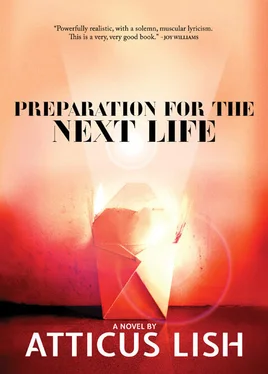But this was the price of a bus ticket, she thought. The price of a hotel for the night, if you were on the road. Meanwhile, she could practice English to her heart’s content with Skinner, a real American, and it wouldn’t cost a thing. She shelved the idea of school. For seven dollars, she bought a notebook and a used Chinese-English dictionary called the New Century, and made a half-hearted effort at teaching herself. She opened the notebook and wrote in it, knowing that she was forming her characters wrong, making geometric shapes that the Chinese had never thought of. It looked as if her first language was something else and it was trying to come out of her letters. So she only wrote a few incoherent words on the first page and, after that, stuck the notebook, which had a kitten on the cover, in her woven plastic bag.
Seven dollars would have bought her a pound and a half of lamb, which she now wished she were eating. To get something for her money, she tried reading in the dictionary at random, holding the onionskin pages in her calloused fingers, studying the words and sounding them out, sounding out the definitions, which were strange, quaint, or outmoded — although she may not have known this.
Warrior: One who is martial, a hero. Love: Two scalewings, the giving of the heart. Freedom: Up to the self. The United States is a freedom country.
She had a bad dream about Bridgeport in the night and called him the next day.
She dreamed that ICE agents came to Chinatown in the new white Homeland Security trucks and piled into the mall and closed off all the exits, shut everything down, and started checking all the workers with a biometric scanner. The agents put them all in line, made them raise their arms, and scanned their hands and retinas. Polo and Sassoon were cleared and allowed to go, but the scan caught everyone who wasn’t legal: the Mexicans and the illegal women. The agents made them lie down on their stomachs. There was nowhere to run and they were going to get her.
When she called him, he sounded remote, but he agreed to meet her after work.
On her way out of the mall, she stopped in the public restroom on the first floor and cleaned the food off her jeans, combed her hair, put on glitter lipstick from the 99-cent store, put on her New York hat, and turned and looked at herself from the back before she walked out. When she saw him in front of Caldor, she hurried over and took his arm.
He didn’t offer to take her anywhere and she didn’t want to invite herself to dinner, so she walked with him, looking at pawnshops, sneaker stores.
You are busy today? she asked.
He didn’t seem to hear questions about himself.
They reached the markets lit by bare bulbs in wire cages. At the cardboard boxes of produce, she pointed out the persimmons, knotweed, ginseng, a spiked fruit the size of a grenade whose name she could not translate, and the dragon eyes, which looked like olives on a vine.
You know this one? It’s call the dragon eye.
She made an OK circle with her thumb and forefinger and clucked her tongue, pointed at her eye, and looked at him.
Longyan. You say it?
A Mexican slashed a box open right behind him and she felt his whole body jump as if he’d been electrocuted.
Skinner?
Yeah. What?
You okay?
He nodded. He looked confused and angry.
The Chinese word is very hard.
Maybe he would like to see a true Asian market. He seemed to agree. She pushed inside and, somewhere in the doorway when they were getting shoved by everyone coming out, he let her arm go. Now she was alone in the store and she didn’t know if he was coming. She took a box off a shelf at random. Beijing Royal Jelly. She set it down. She didn’t see him.
Munggo, congee, Bullhead. She walked slowly deeper into the smell of refrigerant, root, earth, dry goods, wanting to linger near the front. Honey Flavoured Syrup, Old Fujian Wine, Squid Fish Sauce, Cane Vinegar, Coconut Sport, Sarap-Asim, Chicken Essence Drink. A metal tree with a jerky of shredded squid hanging from hooks. Sweet dried pork cost $7.99. They were selling dried powdery balls of pork in plastic cups and luncheon meat in tins. Spam, Ma Ling, Vitarroz, smoke flavor added. She squatted to see the cans, as if she were fascinated by them. Po-Ku mushrooms, young green jackfruit, loquat, lychee, toddy palms. Everything was the kind of thing you added to something else.
On the middle shelves were the three-in-one instant coffees, Oldtown White Coffee, Milo Fuze, and Glow-San Kentucky. Chiu Cheow Sauce, wheat gluten, peanut gluten, pickled lettuce and Frentel. There was Kewpie mayonnaise, peanut butter, and Kool Aid. The Skippy felt good and heavy. She checked the calories. It cost two dollars and fifty-nine cents.
Maybe, she thought. She didn’t know. She put it down.
He came down the aisle when she was in canned fish. Sweet hot sardines were $2.50. The can felt empty, and she put it down.
He picked up a can of smoked bangus.
That’s original, he said.
What?
Nothin. Whatever this is.
It’s fish. You should eat it, she recommended. She might have been a little angry. It was full of nutrition for the body, she told him. Good for long life.
Cooking oil was stacked in a gold pyramid against a wall, fifty-pound bags of rice on forklift pallets. She decided to take her time in the store to punish him a little. She tried to figure calories per dollar for Plum Rose rice in her head. And then she made him follow her to the back of an aisle to look at the cooking gear: butane gas bottles, rice cookers, kitchen scissors, roach spray. A wok was $8.99. She got down on the floor and dug through what they had on the shelf, trying to see if she’d missed anything. She hadn’t. The cheapest rice cooker cost fifteen American dollars and that was too much.
They went past the freezer case of soymilk, the black chickens, and the whole fish on ice. There was so much to eat, she thought. She wasn’t all that angry anymore.
You get something? she asked, thinking they could combine ingredients.
I’ll pass, he said.
He had seen a tub of wriggling mucus-foaming fish with feelers, the dirty aquarium tanks with heavy things floating in the green water.
They were coming up to the butcher counter and she thought of her father making a fire and butchering a lamb, and she took his arm again.
There were gaunt butchers in pink-stained smocks selling chicken gizzards and feet. Skinner looked through the hanging plastic strips. A ribcage was being sectioned with a bandsaw. Bone meal sprayed out and Skinner flinched. The butchers yelled what you want? Women with long glossy black hair demanded organs. Small old women called out for the inside of the stomach, the sponge-like stomach lining, the bloodless color of cabbage. Hurry a little faster! The butchers stood on their toes to see them. A kidney in a paper wrapper was handed over the counter.
Zou Lei looked at the price of lamb. She didn’t know, she said. She glanced at him, saw him looking away. To her, he appeared tired of being here. Maybe she didn’t need.
Some days, she noticed, he would hug her when she came to see him, but he might just as easily open the door and turn his back on her without a word, as he did one evening, and leave her to follow him down the stairs alone to find him lying face-down on his mattress in the dark.
Skinner? You playing hide and seek?
She felt her way to him.
I can put the light?
He said nothing. She sat on his bedside and touched his leg. What has happen to you?
He spoke into the mattress and she couldn’t understand him.
What you say?
I said I have a headache.
She rubbed his leg.
You drink too much alcohol. You go to party, it’s fine. I’m not jealousy. But too much, it’s bad. You are strong man lying in the bed. Look at this strong man. He is lazy man.
Читать дальше












